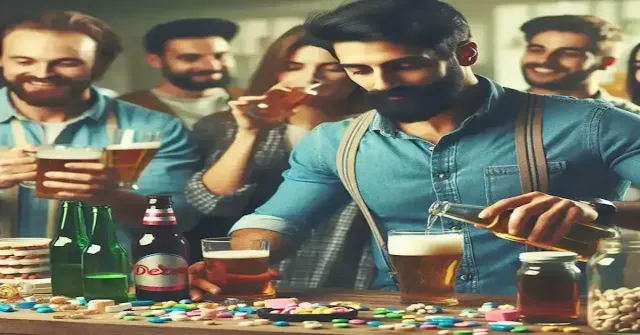Why Mixing Beer with Other Beverages and Alcohols is Not Safe for Health:
"Discover why mixing beer with other beverages and alcohols poses serious health risks. Learn about the dangers, potential side effects, and best practices to ensure safe consumption".Introduction:
Understanding the Dangers of Mixing Beer with Other Beverages and Alcohols
Beer, a popular alcoholic beverage enjoyed worldwide, is often mixed with other drinks, both alcoholic and non-alcoholic. While it might seem like a fun way to create new flavors or increase alcohol potency, mixing beer with other beverages can pose significant health risks. This article explores the reasons why this practice is unsafe and provides guidance on how to enjoy beer responsibly.Alcohol Absorption Rates in the Body
Differences Between Beverage Types:
Alcoholic beverages vary in how quickly they are absorbed by the body. Spirits, with their higher alcohol content, enter the bloodstream faster than beer. When these drinks are combined, the body can have difficulty managing the differing absorption speeds, potentially resulting in erratic levels of intoxication.Impact of Mixing Beverages:
Combining different alcoholic drinks can speed up the rate at which alcohol is absorbed, putting extra strain on the liver and causing blood alcohol levels to rise more quickly than anticipated. This can lead to swift intoxication, impaired decision-making, and a heightened risk of alcohol poisoning.The Science Behind Alcohol Interaction
How Alcohol Affects the Body:
Upon consumption, alcohol impacts several bodily systems, such as the central nervous system, digestive system, and liver. The liver plays a key role in metabolizing alcohol, utilizing enzymes to break it down. Combining various alcoholic beverages can exceed the liver’s capacity to handle these substances, resulting in elevated toxin levels in the bloodstream.Metabolic Confusion:
Consuming a variety of alcoholic beverages with differing compositions and alcohol percentages can disrupt the body’s metabolic processes. The liver, responsible for metabolizing alcohol, operates most efficiently when processing a single type of alcoholic drink. However, when multiple types are consumed, the liver struggles to adapt to the varying alcohol concentrations and byproducts, leading to unpredictable and potentially dangerous physiological responses. This phenomenon, known as “metabolic confusion,” can result in heightened intoxication, increased risk of alcohol poisoning, and prolonged recovery time. To minimize the risks associated with metabolic confusion, it is advisable to stick to a single type of alcoholic beverage and consume it in moderation.Common Beverages Mixed with Beer and Their Risks
Mixing Beer with Spirits:
Increased Alcohol Content
Combining beer with spirits such as vodka, rum, or whiskey results in a substantial rise in the drink’s alcohol concentration. This heightened potency can lead to quicker intoxication, diminished decision-making abilities, and an elevated risk of alcohol-related emergencies.Dehydration and Overconsumption
Spirits typically have a higher alcohol content than beer, and when combined, they can obscure the flavor of the alcohol. This masking effect may encourage individuals to drink more than they realize, resulting in overconsumption. Such excessive intake not only raises the risk of dehydration but also heightens the chances of experiencing intense hangovers and potential long-term health complications.Beer Cocktails with Sugary Mixers
Elevated Blood Sugar Levels
Blending beer with sugary beverages such as sodas or fruit juices can trigger a spike in blood sugar levels. For individuals with diabetes or prediabetes, this sudden increase in blood sugar can be particularly hazardous. Even for those without these conditions, these spikes may contribute to long-term metabolic complications.Added Caloric Intake
The addition of sugary mixers introduces unnecessary calories to your drink, potentially leading to weight gain and associated health issues like heart disease and high blood pressure.Beer with Caffeinated Drinks
Masked Intoxication:
Caffeine is a stimulant that can conceal the depressant effects of alcohol, making it challenging to accurately gauge your level of intoxication. This masking effect may encourage higher alcohol consumption, consequently increasing the risks of alcohol poisoning and accidents.Increased Heart Rate
Consuming alcoholic beverages and caffeinated drinks can have a significant impact on your heart rate. When these two substances are combined, they can create a synergistic effect, placing additional strain on your cardiovascular system. This combination may lead to the development of heart palpitations and other potentially serious health complications.Short-Term and Long-Term Health Risks
Immediate Effects:
Nausea and Vomiting
Combining various types of alcohol can irritate the stomach lining, resulting in nausea and vomiting. This discomfort not only affects your well-being but can also lead to dehydration and imbalances in electrolytes.Impaired Judgment and Coordination
Alcohol consumption negatively impacts cognitive abilities and motor skills. When different types of alcohol are mixed, these impairments can intensify, increasing the likelihood of accidents, injuries, and poor decision-making.Long-Term Health Concerns
Liver Damage:
The liver is essential for breaking down and processing alcohol. Mixing different alcoholic beverages can place additional strain on this vital organ, potentially leading to liver damage over time. Chronic heavy drinkers may develop conditions such as fatty liver disease, hepatitis, or cirrhosis.Increased Risk of Addiction:
The combination of various alcohol types can heighten their addictive properties, raising the risk of developing a dependence on alcohol. This addiction can result in long-term health complications and adversely affect both personal and professional aspects of life.Statistics and Studies on Alcohol Mixing
Alcohol-Related Accidents
Mixing different types of alcohol is associated with an increased risk of accidents, including vehicle crashes and falls. This unpredictability in effects can significantly impair judgment and coordination, creating hazardous situations.Hospital Admissions
Additionally, there is a marked rise in hospital admissions linked to complications from mixing alcohols, such as alcohol poisoning, severe dehydration, and injuries resulting from accidents.First Aid for Alcohol Overconsumption
Recognizing Symptoms of Alcohol Poisoning
Recognizing alcohol poisoning is vital; symptoms include confusion, vomiting, seizures, slow breathing, and unconsciousness. Immediate action involves calling emergency services, keeping the individual awake if possible, and providing details about the consumed alcohol to medical personnel.Immediate Actions for Suspected Alcohol Poisoning
If you suspect someone is experiencing alcohol poisoning, it is crucial to act quickly:1. Call Emergency Services: Dial emergency services right away to get professional help. In these scenarios, acting quickly is crucial.
2. Keep the Person Awake: If the individual is conscious, try to keep them awake and sitting up. This can help prevent choking and allows for better monitoring of their condition.
3. Do Not Leave Them Alone: Stay with the person to ensure their safety. Continuous observation can help you notice any changes in their condition.
4. Gather Information: Be prepared to provide medical personnel with details about the types and amounts of alcohol consumed, as well as any other substances that may have been ingested. This information can be critical for effective treatment.
Taking these steps can make a significant difference in the outcome for someone experiencing alcohol poisoning.
Safe Drinking Practices:
Tips for Responsible Drinking
Stick to One Type of Alcohol:
To reduce health risks associated with alcohol consumption, it's wise to stick to one type of alcoholic beverage during your drinking session. This approach allows your body to metabolize alcohol more effectively and minimizes the chances of experiencing adverse reactions, such as nausea or dizziness.Hydrate Regularly
Incorporating water into your drinking routine is essential. Sipping water between alcoholic drinks not only helps prevent dehydration but also mitigates the intensity of hangovers. Additionally, staying hydrated aids in pacing your alcohol consumption, allowing you to enjoy your time while maintaining control over your intake.Avoid Mixing with Energy Drinks
Combining alcohol with energy drinks can be particularly risky, as the stimulating effects of energy drinks can mask the depressant effects of alcohol. This may lead individuals to underestimate their level of intoxication, resulting in overconsumption and an increased risk of alcohol-related harm. To ensure a safer drinking experience, it’s advisable to avoid mixing these two types of beverages altogether.Conclusion:
The Bottom Line:
Mixing beer with other beverages and types of alcohol can lead to significant health risks, both in the short term and over time. The dangers range from an increased likelihood of alcohol poisoning to potential long-term liver damage. By being aware of these risks and implementing safe drinking practices, you can enjoy alcohol responsibly while protecting your health.
Always remember that moderation is crucial, and when uncertain, it's best to stick to one type of alcoholic beverage during a drinking session.
This article highlights the dangers associated with mixing beer and other alcoholic drinks, underscoring the importance of responsible drinking. With the right knowledge and habits, you can enjoy your beverages while prioritizing your well-being.
Why does mixing different alcoholic drinks make me feel sicker?
Mixing various types of alcohol can result in higher levels of toxins in your body, which can overwhelm your liver. This overload may lead to symptoms such as nausea, vomiting, and other signs of alcohol poisoning.
Can mixing beer with other drinks increase my risk of alcohol poisoning?
Yes, combining beer with stronger alcoholic beverages can significantly heighten your risk of alcohol poisoning. The higher alcohol content and potential for rapid consumption can exacerbate the effects of intoxication.
Are there any safe mixers for beer?
While it's generally advisable to avoid mixing beer with other alcoholic drinks, non-alcoholic mixers such as water, club soda, or a splash of lemon juice are safer options. These can enhance your drink without increasing alcohol content.
How can I determine if I'm consuming too much alcohol?
Indicators of heavy drinking encompass regular memory lapses, an inability to regulate your alcohol consumption, and ignoring your obligations. If you notice these indicators, it may be time to evaluate your drinking habits and consider seeking help.
Why does carbonation affect alcohol absorption?
Carbonation can accelerate the absorption of alcohol into the bloodstream, leading to enhanced effects and an increased risk of overconsumption. This can make it harder to gauge your level of intoxication.
Is it safe to mix beer with energy drinks?
No, mixing beer with energy drinks is not safe. The stimulating effects of energy drinks can mask the depressant effects of alcohol, which may lead to excessive drinking and increased health risks.





.webp)
